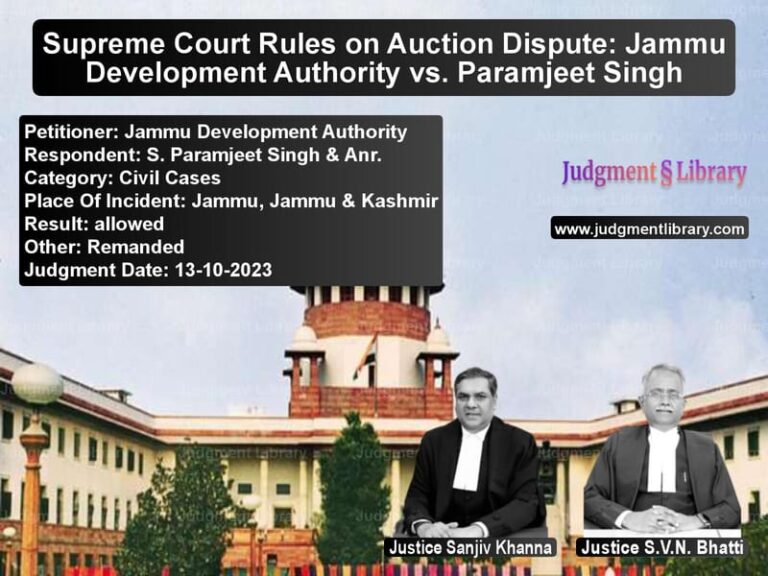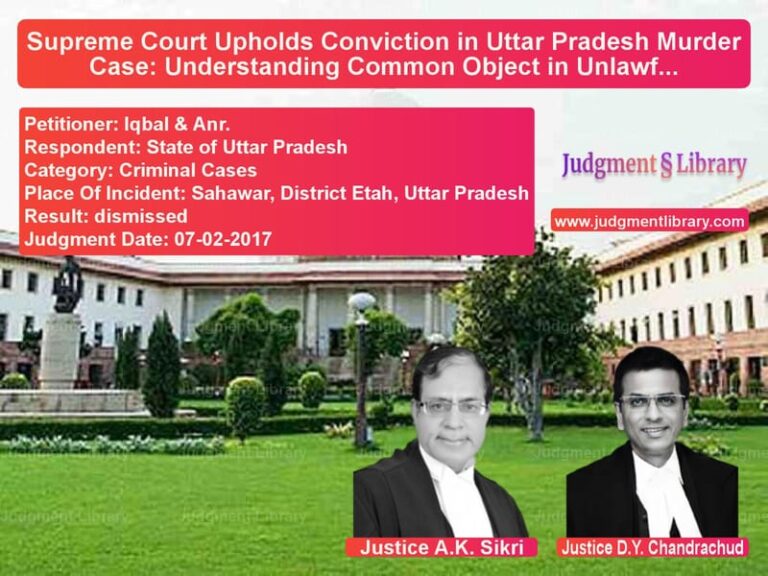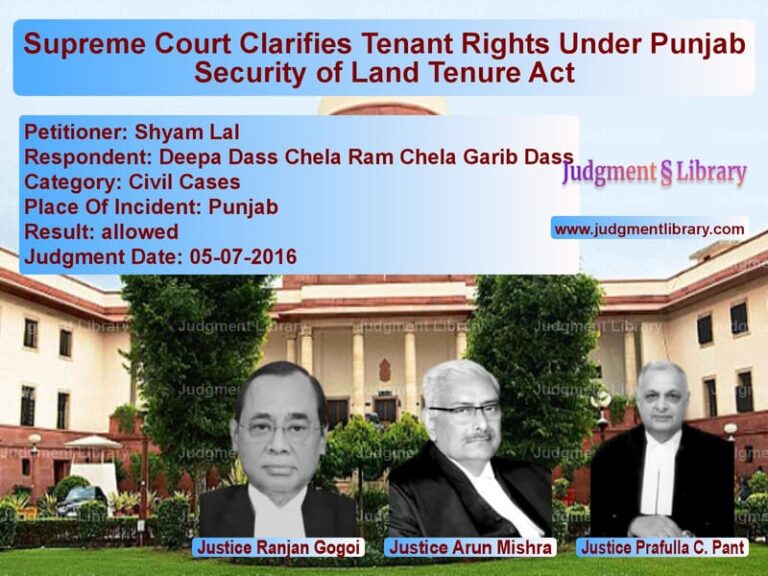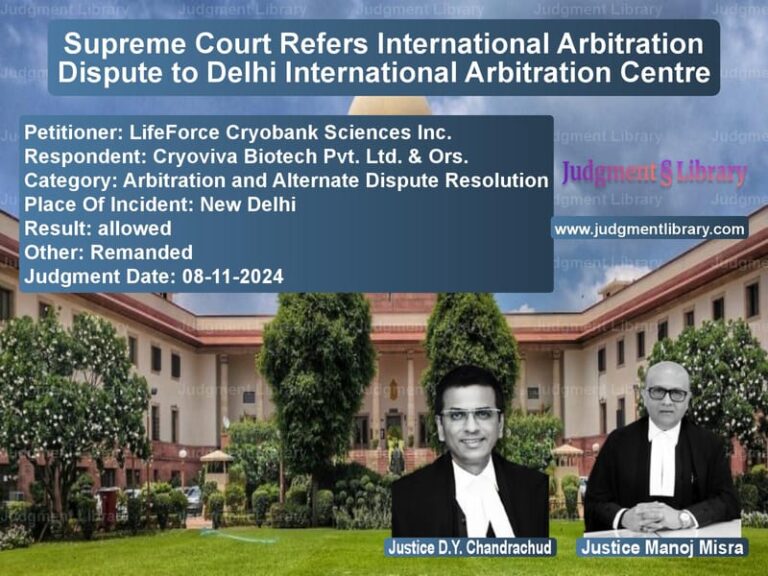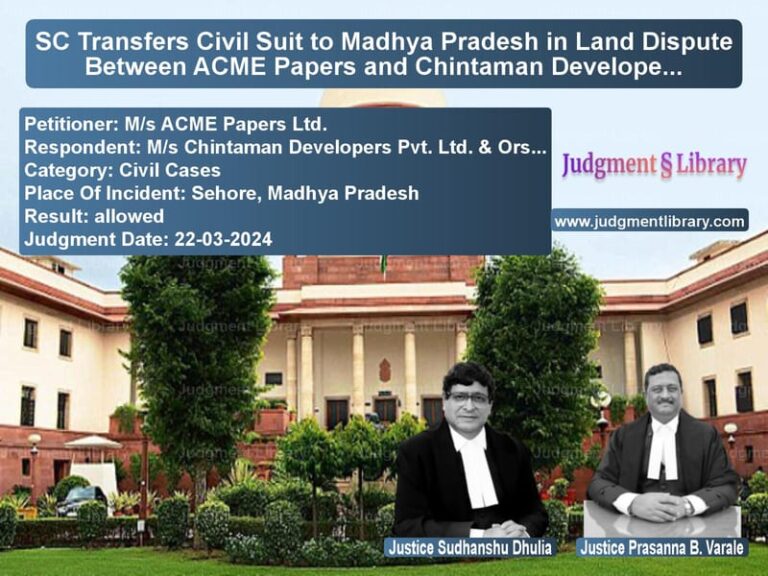Supreme Court Acquits Three in Gujarat Murder Case After 13 Years: A Landmark Judgment on Wrongful Convictions
The Supreme Court of India recently acquitted three men who had been convicted for the murder of Mohammad Sohail in Anand, Gujarat. The case, which had gone through multiple levels of judicial scrutiny, revolved around allegations of a conspiracy to kill the victim due to a dispute over water supply. The judgment overturns the Gujarat High Court’s verdict, granting relief to the accused after 13 years of legal battles.
Background of the Case
The case originated in 2011, when the prosecution alleged that the accused, Allarakha Habib Memon, Amin @ Lalo Aarifbhai Memon, and Mohmedfaruk @ Palak Safibhai Memon, conspired to murder Mohammad Sohail due to an altercation over water supply in their residential colony. The prosecution claimed that the accused planned the attack, armed themselves with daggers and other sharp weapons, and fatally assaulted the victim on May 4, 2011.
The trial court convicted the accused under Section 302 read with Section 120B of the Indian Penal Code (IPC) and sentenced them to life imprisonment. The Gujarat High Court upheld the conviction in 2019, leading the accused to appeal to the Supreme Court.
Petitioners’ Arguments
The defense argued that the prosecution had failed to establish guilt beyond a reasonable doubt. Their key contentions included:
- The alleged eyewitness testimony was unreliable and inconsistent.
- The FIR was filed at 11:00 PM, three hours after the incident, raising questions about its authenticity.
- The forensic evidence did not conclusively link the accused to the crime.
- The prosecution failed to prove a premeditated conspiracy.
- The trial court and the High Court ignored critical discrepancies in witness statements.
Respondent’s Arguments
The State of Gujarat defended the convictions, arguing that:
- The FIR was filed promptly after the victim was declared dead.
- The forensic evidence matched the blood on the weapons recovered from the accused.
- The accused had a motive, as the murder stemmed from a personal grudge.
- The prosecution had presented multiple witnesses who had seen the attack.
Supreme Court’s Observations
The Supreme Court, after reviewing the evidence and arguments, found several inconsistencies in the prosecution’s case:
- The FIR was delayed, and the explanation given for the delay was not satisfactory.
- The prosecution failed to establish beyond a reasonable doubt that the accused were present at the crime scene.
- The forensic evidence, while suggestive, was not conclusive enough to warrant a conviction.
- Multiple eyewitnesses gave contradictory accounts of the incident.
- There was no concrete evidence proving a conspiracy between the accused.
Final Judgment
On August 8, 2024, the Supreme Court ruled:
- The trial court and High Court judgments were quashed.
- The accused were acquitted of all charges.
- Those in jail were ordered to be released immediately if not required in any other case.
Implications of the Judgment
The Supreme Court’s ruling sets a significant precedent:
- Reinforcing Due Process: The judgment underscores the necessity of proving guilt beyond a reasonable doubt.
- Strict Scrutiny of Eyewitness Testimony: The court reiterated that contradictory and unreliable testimonies cannot be the sole basis for conviction.
- Importance of Timely FIR: The decision highlights that delays in filing an FIR must be explained satisfactorily, or they can weaken the prosecution’s case.
- Forensic Evidence Must Be Conclusive: The judgment reaffirms that forensic evidence must establish guilt beyond doubt.
- Role of Higher Judiciary: The ruling demonstrates how appellate courts play a crucial role in rectifying wrongful convictions.
Impact on Wrongful Convictions
Cases of wrongful conviction often result in innocent individuals spending years behind bars. The Supreme Court’s ruling in this case highlights several key takeaways for the Indian legal system:
- Need for Judicial Vigilance: Courts at all levels must ensure that evidence is scrutinized rigorously before convicting individuals.
- Importance of Legal Aid: Many wrongful convictions arise due to inadequate legal representation. Strengthening access to competent defense lawyers can prevent such errors.
- Addressing Judicial Delays: Speedy trials must be prioritized to ensure that innocent individuals are not subjected to prolonged incarceration.
- Strengthening Forensic Investigation: Law enforcement agencies must invest in scientific and forensic investigation techniques to prevent reliance on inconsistent witness statements.
Case Comparisons
This judgment aligns with other landmark cases where the Supreme Court intervened to prevent miscarriage of justice:
- State of Rajasthan vs. Kashi Ram (2006): The Supreme Court held that convictions cannot be based solely on circumstantial evidence unless they lead to a conclusive finding.
- Navjot Sandhu (Parliament Attack Case) (2005): This case emphasized that evidence must be corroborated beyond doubt before holding an accused guilty.
- Santosh Kumar Singh vs. State (2010): The Supreme Court overturned the death sentence awarded by the High Court, citing unreliable evidence.
Conclusion
The Supreme Court’s ruling in Allarakha Habib Memon & Others vs. State of Gujarat is a landmark decision ensuring that wrongful convictions do not stand. The case serves as a reminder that justice demands thorough scrutiny of evidence, particularly in serious criminal cases involving life sentences. By emphasizing due process and fairness, the ruling strengthens trust in the judiciary and sets a precedent for future cases.
Petitioner Name: Allarakha Habib Memon & Others.Respondent Name: State of Gujarat.Judgment By: Justice B.R. Gavai, Justice Sandeep Mehta.Place Of Incident: Anand, Gujarat.Judgment Date: 08-08-2024.
Don’t miss out on the full details! Download the complete judgment in PDF format below and gain valuable insights instantly!
Download Judgment: allarakha-habib-memo-vs-state-of-gujarat-supreme-court-of-india-judgment-dated-08-08-2024.pdf
Directly Download Judgment: Directly download this Judgment
See all petitions in Murder Cases
See all petitions in Bail and Anticipatory Bail
See all petitions in Fraud and Forgery
See all petitions in Public Interest Litigation
See all petitions in Judgment by B R Gavai
See all petitions in Judgment by Sandeep Mehta
See all petitions in allowed
See all petitions in Quashed
See all petitions in supreme court of India judgments August 2024
See all petitions in 2024 judgments
See all posts in Criminal Cases Category
See all allowed petitions in Criminal Cases Category
See all Dismissed petitions in Criminal Cases Category
See all partially allowed petitions in Criminal Cases Category


